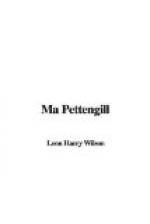I said Lew Wee had the look of one ever expecting the worst; even more than the average of his race.
“It ain’t that,” said my hostess. “He don’t expect anything at all; or mebbe everything. He takes what comes. If it’s good or bad, he says, ’Can happen!’ in the same tone of voice; and that ends it. There he is now, knowing that all this good money he saved by hard labour has gone up in smoke, and paying the loss no more attention that if he’d merely broke a string on that squeaky long-necked contraption he saws.”
“He seems careless enough with his money, certainly.”
“Sure, because he don’t believe it does the least good to be careful.”
From a cloth sack the speaker poured tobacco into a longitudinally creased brown paper and adeptly fashioned something in the nature of a cigarette.
“Ain’t I been telling him for a year to buy Liberty Bonds with his money? He did buy two, being very pro-American on account of once having a violent difference with a German; and he’s impressed with the button the Government lets him wear for it. He feels like the President has made him a mandarin or something; but if the whole Government went flooey to-morrow he’d just say, ‘Can happen!’ and pick up his funny fiddle. Of course it ain’t human, but it helps to keep help. I had him six years now, and the only thing that can’t happen is his leaving. I don’t say there wasn’t reasons why he first took the place.”
Reasons? So there had been reasons in the life of Lew Wee. I had suspected as much. I found something guarded and timid and long-suffering in his demeanour. He bore, I thought, the searing memory of an ordeal.
“Reasons!” I said, waiting.
“Reasons for coming this far in the first place. Wanted to save his life. I don’t know why, with that fatal idea he sticks to. Habit, probably. Anyway, he had trouble saving it—kind of a feverish week.”
She lighted the cigarette and chuckled hoarsely between the first relishing whiffs of it.
“Yes, sir; that poor boy believes the country between here and the coast is inhabited by savages; wild hill tribes that try to exterminate peaceful travellers; a low kind of outlaws that can’t understand a word you tell ’em and act violent if you try to say it over. And having got here, past the demons, I figure he’s afraid to go back. I don’t blame him.”
Ordinarily, this would have been enough. Now the lady merely smoked and chuckled. When I again uttered “Well?” with a tinge of rebuke, she came down from her musing, but into another and distant field. It was the field of natural history, of zoology, of vertebrates, mammals, furred quadrupeds—or, in short, skunks. One may as well be blunt in this matter.
Ma Pettengill said the skunk got too little credit for its lovely character, it being the friendliest wild animal known to man and never offensive except when put upon. Wasn’t we all offensive at those times? And just because the skunk happened to be superbly gifted in this respect, was that any reason to ostracize him?




